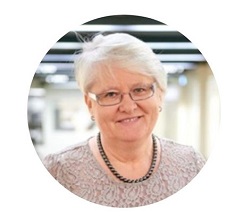Keynotes
Liat Ayalon, PhD

Liat Ayalon, PhD
Research and policy implications in the field of ageism
Prof. Ayalon will discuss the concept of ageism with illustrations from several fields including the media and art. A particular focus will be given to the intersections between ageism and sexism in different contexts and to ageism in the age of scarce resources. The importance of familiarizing the public with the concept of ageism and best practices associated with social campaigns to combat ageism will be explored. As combating ageism is one of the four pillars of the UN Decade of Healthy Ageing, research and policy gaps for the next decade will be highlighted.
Liat Ayalon, PhD is a Professor in the School of Social Work, at Bar Ilan University, Israel. Prof. Ayalon coordinates an international EU funded Ph.D. program on the topic of ageism (EuroAgeism.eu). She is also the Israeli PI of the EU funded MascAge program to study ageing masculinities in literature and cinema. Between 2014 and 2018, Prof. Ayalon has led an international research network on the topic of ageism, funded through COST (Cooperation in Science and Technology; COST IS1402, notoageism.com). She consults both national and international organizations concerning the development and evaluation of programs and services for older adults.
Vitalija Gaucaite Wittich

Vitalija Gaucaite Wittich
Changing policy context: where we are 20 years after the Second World Summit on Ageing (MIPAA)
Population ageing impacts all spheres of society and is taking place in the context of an increasingly interconnected, dynamic and digitalized environment as well as in the face of climate change and environmental degradation. Adapting to population ageing and responding to the needs, preferences and rights of persons along their life course and individual ageing trajectories requires an important adjustment of government policy, societal awareness and attitudes, and the way generations live together.
The Madrid International Plan of Action on Ageing (MIPAA), endorsed at the Second World Assembly in 2002, is the principal international policy framework guiding ageing-related policy in the 21st century. By introducing mainstreaming ageing as a recommended policy strategy that ensures the integration of ageing into broader policy agendas on social and economic development and human rights, MIPAA framework considers the dynamics and implications of demographic change for all generations and across all policy fields, including education systems, labour markets, social and cultural life, and changing demands and needs for goods and services.
Twenty years onwards from the adoption of the MIPAA, an important progress has been made at both international and national levels to enhance political attention and action on ageing and develop cross-cutting policy measures to respond to the challenges and realize the opportunities of ageing societies. However, short-termism in national politics may deter due consideration of transformative power of population ageing with its wide-ranging implications for all aspects of societies.
Vitalija Gaucaite Wittich, PhD over the last 12 years was leading the Population Unit of the United Nations Economic Commission for Europe (UNECE) and was responsible for UNECE work on population ageing and intergenerational relations. She coordinated the activities of the UNECE Standing Working Group on Ageing and oversaw the organization of the reviews of national policies and strategies in implementing the Madrid International Plan of Actions on Ageing (MIPAA, 2002) in the UNECE region, capacity development and publication of policy briefs in the area of population ageing. She also acted as the UNECE coordinator for the Generations and Gender Programme and led UNECE activities related to the review of implementation of the Programme of Action of International Conference on Population and Development (ICPD, 1994). Prior to joining the Population Unit in October 2010, Ms. Gaucaite Wittich worked in the Statistics and Economic Analysis Divisions of UNECE. Ms. Gaucaite Wittich has a doctoral degree in Social sciences and before joining UNECE was an Associate Professor of Economics at Vilnius University in Lithuania.
Iva Holmerová, M.D., Ph.D.

Iva Holmerová, M.D., Ph.D.
The role of different policy and research interventions in the field of dementia
Prof. Holmerová will highlight the role of different initiatives in the field of dementia. Alzheimer Europe as an umbrella organisation of Alzheimer societies in Europe is committed to promoting the rights, dignity and autonomy of people living with dementia by its different activities. The Joint Action on Dementia with its two subsequent programmes: ALCOVE, and the Act on Dementia, promoting collaborative actions among Member States. Very important role has taken the WHO which in 2017 launched the “Global action plan on the public health response to dementia 2017-2025”, in 2021 published “Towards a dementia-inclusive society: WHO toolkit for dementia-friendly initiatives (DFIs)”, and its Global Dementia Observatory (GDO) tracks the progress of countries against the measures in the global action plan. In September 2021, the WHO published the “Global Status Report on the public health response to dementia”. The important actor in the field of research of dementia is the World Dementia Council (WDC) which hosted in 2018 a summit bringing together global experts from different disciplines in dementia to reach consensus on some of the global challenges the world faces in reaching the 2025 goals (set by the G8 in 2013).
Iva Holmerová, M.D., PhD is head of the Centre of Expertise in Longevity and Long-Term Care, Faculty of Humanities, Charles University in Czech Republic. Founding director and consultant geriatrician at the Centre of Gerontology Praha, the founding board member of the Czech Alzheimer Society, member of the Government Committee on Ageing. Past president of the Czech Society of Gerontology and Geriatrics. Since 2016 chairperson of Alzheimer Europe. Publications on health and social care interface, dementia, depression, family caregivers, dance and movement therapy, ethics in geriatric care. She has received many awards during her career. Some of them are Outstanding Contribution to Czech Gerontology, Makropulos award of the Ministry of Health on behalf of the Centre of Gerontology, the Czech Business Chamber Platinum Laurus Award, Aeskulap Academy Award, prize of the Zadak Foundation for gerontology, Medical Society JEP award 2015, Charles University Silver Medal 2020 and Charles University Donation award for excellent research.
Ricardo Rodrigues, Ph.D.

Ricardo Rodrigues, Ph.D.
Unequal care (still): Adding a time dimension to inequalities in care across time
Evolving socio-demographic trends such as changing gender norms, increasing labour participation of women and shifts in marriage and divorce rates have been portrayed as factors liable to reduce the number of informal carers or at least the amount of time available to care for frail older people. Conversely, some of these same changes could act towards men taking up a greater share of informal caregiving, thus resulting in a more gender equal distribution of caregiving or/and of time spent caring.
Despite the relevance of these potential developments for both researchers and policy-makers, ‘time’ is only seldom included in the analysis of inequalities in caregiving, namely gender inequalities, and we know very little about how caregiving has evolved across different periods and whether the above-mentioned changes have impacted the gender gap in informal care. Drawing on existing studies and results from the FutureGEN project, I will make the case for the inclusion of ‘time’ as a central aspect to consider in the analysis of inequalities in caregiving. I will consider ‘time’ as change between different years or periods or across cohorts; as well as ‘time’ in the sense of duration, intensity and distribution of care and show that this too is key dimension to the study of inequalities in caregiving.
Ricardo Rodrigues, PhD is currently the Head of the Health and Care Unit at the European Centre for Social Welfare Policy and Research, in Vienna. He has a background in economics and a PhD in social policy (University of York, UK). His main current research interests are inequalities in health and care, gender, comparative social policy and ageing, using a mix of qualitative and quantitative research methods. He started his career at the Portuguese Ministry of Social Affairs and seeks to maintain a strong link between research and policy-making, by engaging with relevant stakeholders, ranging from international organizations with whom he has regularly worked (e.g. OECD and WHO Europe) to advocacy groups (e.g. Eurocarers and Age, Platform Europe). He provides regular technical advice to national governments and the European Commission on matters related to long-term care in Europe.
